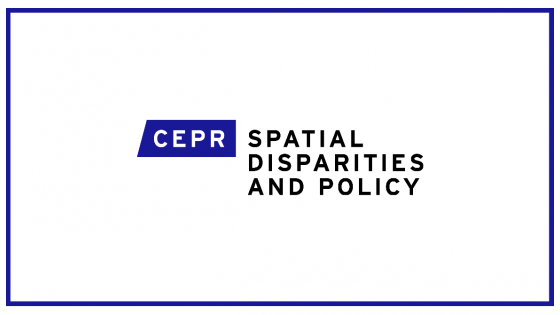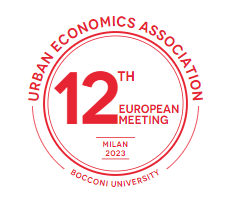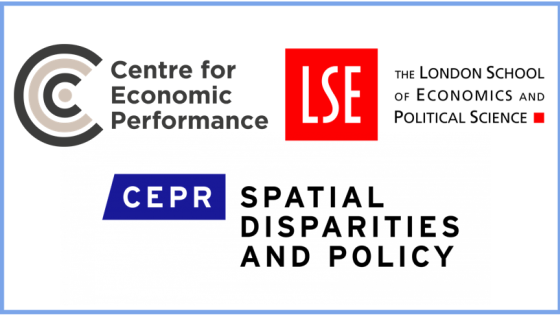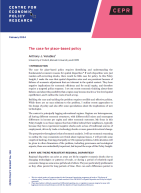In May the Spatial Disparities RPN hosted a session at the European Meetings of the Urban Economics Association in Milan.
The session, chaired by Henry Overman, focussed on the third of the key questions the network aims to address:
- Should spatial disparities be a policy priority?
- What causes spatial disparities and their persistence over time?
- What do we know about policy that works and that doesn’t work?
The papers presented aim to understand the effects of a set of place-based interventions that differ from the typical business-focused, enterprise zone policy that has been the subject of much empirical research. The session examined three local public policy interventions aimed at improving the lives of people in relatively deprived areas through access to healthcare, reductions in crime and access to good schools.
The first paper, presented by Amrita Kulka (University of Warwick) (and co-authored with Dennis McWeeny) investigates a US policy which aims to directly incentivise doctors to move to rural areas. These areas typically lack primary care physicians and exhibit worse health outcomes relative urban areas, providing indicative evidence that a lack of access to preventative healthcare may in part lie behind the poor longer-term health of rural populations.
The financial incentive the authors analyse takes the form of a student loan forgiveness, or scholarship programme worth on average nearly $100,000 per physician. The paper does find some effect of the programme in increasing the number of physicians working in rural counties, but the authors’ model of physician location choice implies that much larger incentives would be necessary to induce sufficient doctors to re-locate to rural areas and address current imbalances. They also explore alternative policies including using a tax on physicians who practice in urban areas combined with a subsidy to those in rural areas, to increase the attractiveness of the latter as a place to live and work.
The research links to the more general point that much of measured spatial inequality, for example in incomes, is driven by where high-skilled workers choose to live. Reducing spatial disparities on this measure would involve reversing a trend that has seen the high-skilled increasingly drawn to highly productive cities. The paper sheds some light on the sheer magnitude of this task.
The second paper presented by Jonas Søndergaard Sørensen (Aarhus University ) (and co-authored by Anna Piil Damm and Ahmad Hassani), looks at the effects of an intervention in disadvantaged public-housing neighbourhoods in Denmark. These neighbourhoods were eligible for additional public funding for infrastructure and housing improvements, and for social programmes and an increased local police presence that aimed to combat criminal activity among residents. The paper looks at whether the programme changed the residential composition of these neighbourhoods, as well as effects on unemployment and conviction rates among those originally resident in the targeted areas.
The main effect of the programme that the paper highlights is that on crime. Targeted neighbourhoods saw a reduction in convictions – both through a compositional change, and, importantly, through a reduction in the likelihood of criminal behaviour among the original residents, including those with a history of criminal activity. Since crime is often cited as a major concern by those living in deprived areas, the study suggests that policies which directly target anti-social and criminal behaviour can be effective in improving poorer neighbourhoods.
The third paper in the session, presented by Miren Lafourcade (University Paris-Saclay, PSE & CEPR), (and co-authored with Manon Garrouste), examined the effects of a place-based policy in France. The policy involved a re-drawing of the geographic boundaries identifying relatively deprived neighbourhoods, within which schools qualified for additional state funding.
The paper illustrates that place-based policies can have unintended consequences. A common concern about the use of policies that target specific locations is that as an area becomes more attractive, in-migration can mean that those originally resident in an area do not necessarily gain the benefits. But in the case of the policy in question, the unintended consequence was more of a stigmatising, “zone-and-shame” effect, leading to a set of schools located in neighbourhoods eligible for additional funding actually becoming less attractive for parents.
Public schools labelled as being in eligible areas saw an immediate and persistent drop in entry-cohort pupil enrolment in the post-reform years, with parents instead choosing public schools outside the designated areas, or for the wealthy, shifting to private education. There is also evidence of a short-lived decrease in pupils’ test-scores inside the designated areas, suggesting that this spatial re-sorting may have temporarily offset any positive effect from the policy. On the flipside the authors find little evidence of positive enrolment effects for schools in areas that lost their designated status. The findings suggest that policies that label specific areas as eligible for additional support might in fact increase social and educational segregation, with potential unintended consequences for pupils’ educational outcomes in a setting where peer effects are likely to matter.
The session highlighted new evidence on how interventions directly targeting local public service provision can shape outcomes for residents. The RPN has launched a VoxEU Debate on the Causes and Consequences of Spatial Disparities and would welcome further contributions on this topic.





